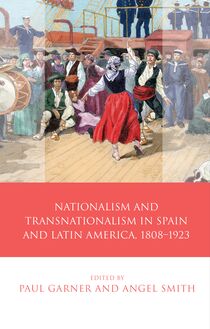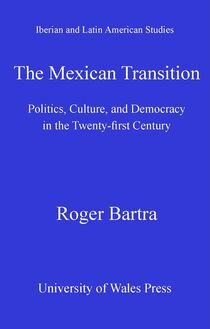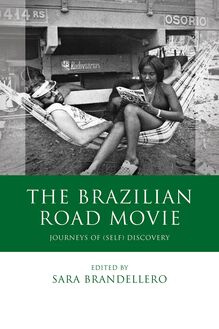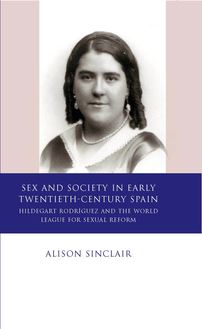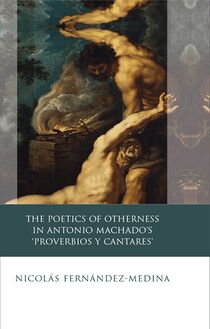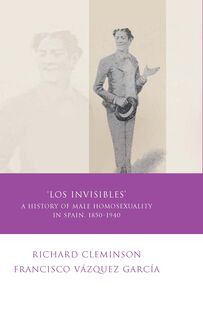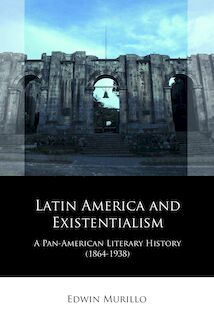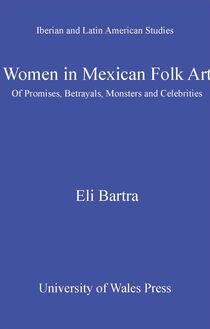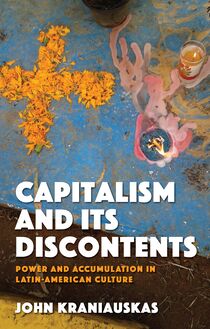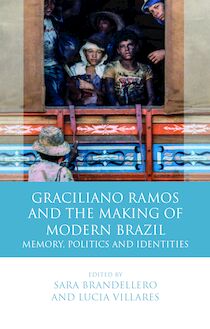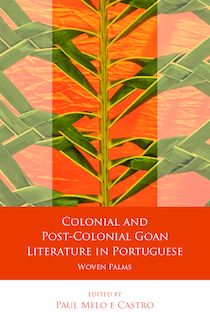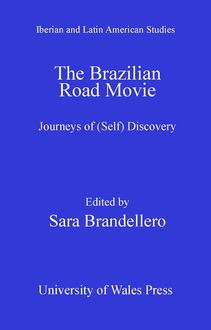The Spanish Civil War , livre ebook
127
pages
English
Ebooks
2013
Vous pourrez modifier la taille du texte de cet ouvrage
Obtenez un accès à la bibliothèque pour le consulter en ligne En savoir plus
Découvre YouScribe en t'inscrivant gratuitement
Découvre YouScribe en t'inscrivant gratuitement
127
pages
English
Ebooks
2013
Vous pourrez modifier la taille du texte de cet ouvrage
Obtenez un accès à la bibliothèque pour le consulter en ligne En savoir plus
Publié par
Date de parution
30 mars 2013
Nombre de lectures
4
EAN13
9781783160235
Langue
English
Poids de l'ouvrage
1 Mo
This book features cutting, edge, interdisciplinary research on the legacy of the Spanish Civil War by established and new scholars from across the world.
Publié par
Date de parution
30 mars 2013
Nombre de lectures
4
EAN13
9781783160235
Langue
English
Poids de l'ouvrage
1 Mo
IBERIAN AND LATIN AMERICAN STUDIES
The Spanish Civil War
Series Editors
Professor David George (Swansea University) Professor Paul Garner (University of Leeds)
Editorial Board
David Frier (University of Leeds) Lisa Shaw (University of Liverpool) Gareth Walters (Swansea University) Rob Stone (Swansea University) David Gies (University of Virginia) Catherine Davies (University of Nottingham) Richard Cleminson (University of Leeds)
Other titles in the series
The Mexican Transition: Politics, Culture and Democracy in the Twenty-first Century Roger Bartra
Adolfo Bioy Casares: Borges, Fiction and Art Karl Posso
Barcelona: Visual Culture, Space and Power Helena Buffery Carlota Caulfield
From Silver Screen to Spanish Stage: The Humorists of the Madrid Vanguardia and Hollywood Film Stuart Nishan Green
Modern Argentine Poetry: Exile, Displacement, Migration Ben Bollig
Catalonia: National Identity and Cultural Policy Kathryn Crameri
Melancholy and Culture: Diseases of the Soul in Golden Age Spain Roger Bartra
The Poetics of Otherness in Antonio Machado’s ‘Proverbios y Cantares’ Nicolas Fernandez-Medina
© The contributors, 2013
All rights reserved. No part of this book may be reproduced in any material form (including photocopying or storing it in any medium by electronic means and whether or not transiently or incidentally to some other use of this publication) without the written permission of the copyright owner except in accordance with the provisions of the Copyright, Designs and Patents Act 1988. Applications for the copyright owner’s written permission to reproduce any part of this publication should be addressed to The University of Wales Press, 10 Columbus Walk, Brigantine Place, Cardiff CF10 4UP.
www.uwp.co.uk
British Library CIP A catalogue record for this book is available from the British Library.
ISBN 978-0-7083-2578-0 e-ISBN 978-1-78316-023-5
The right of the contributors to be identified as author of this work has been asserted in accordance with sections 77, 78 and 79 of the Copyright, Designs and Patents Act 1988.
Typeset by Mark Heslington Ltd, Scarborough, North Yorkshire Printed by CPI Antony Rowe, Chippenham, Wiltshire
Contents
Series Editors’ Foreword
List of Illustrations
Acknowledgements
Notes on Contributors
Introduction Anindya Raychaudhuri
Chapter 1: Franco, the Catholic Church and the Martyrs Julián Casanova
Chapter 2: American Women and Anti-fascism in the Spanish Republican Relief Campaigns, 1936–1939 Eric R. Smith
Chapter 3: Forgotten Names, Remembered Faces – The Bookshop Manager John D. Mehta
Chapter 4: At Their Most Vulnerable: The Memory of British and Irish Prisoners of War in San Pedro de Cardeña David Convery
Chapter 5: The Tragic Exodus: Málaga, February 1937 Andrés Arenas and Enrique Girón
Chapter 6: (Per)Forming Historical Memories of the Spanish Civil War: Leaving Monuments for Magazines Clare Wydell
Chapter 7: The Spanish Civil War and the Politics of Affectivity in the New Millennium: La guerra de esquelas as an Act of Memory Helena López
Chapter 8: Battles of the Past: The Siege of the Alcázar of Toledo in Collier’s Weekly Mercedes Aguirre
Chapter 9: Dust to Dust: Symbolism of Earth in the Memorialisation of the Spanish Civil War Anindya Raychaudhuri
Chapter 10: ‘Grieving in a New Way for New Losses’: British Elegies on the Spanish Civil War Patricia Rae
Chapter 11: ‘It’s the Art of Always Falling on Your Feet!’ Exile, Communism and Memories of the Spanish Civil War in the Writing of Jorge Semprún Stephen Hopkins
Chapter 12: Remembering the Spanish Civil War in Fiction: Dulce Chacón’s La voz dormida and Ángeles Caso’s Un largo silencioSarah Leggott
Chapter 13: Dangers and Insights: Auden’s ‘Spain’ Edward Quipp
Chapter 14: Inspired Neglect? Three Fascist Artists of the Spanish Civil War Rob Stradling
Chapter 15: A New Reality: Anarchism and Visual Culture in Twentieth-century Spain Sharif Gemie
Series Editors’ Foreword
Over recent decades the traditional ‘languages and literatures’ model in Spanish departments in universities in the United Kingdom has been superseded by a contextual, interdisciplinary and ‘area studies’ approach to the study of the culture, history, society and politics of the Hispanic and Lusophone worlds – categories that extend far beyond the confines of the Iberian Peninsula, not only in Latin America but also to Spanish-speaking and Lusophone Africa.
In response to these dynamic trends in research priorities and curriculum development, this series is designed to present both disciplinary and interdisciplinary research within the general field of Iberian and Latin American Studies, particularly studies that explore all aspects of Cultural Production (inter alia literature, film, music, dance, sport) in Spanish, Portuguese, Basque, Catalan, Galician and indigenous languages of Latin America. The series also aims to publish research in the History and Politics of the Hispanic and Lusophone worlds, at the level of both the region and the nation-state, as well as on Cultural Studies that explore the shifting terrains of gender, sexual, racial and postcolonial identities in those same regions.
List of Illustrations
Figures
Figure 1 ‘Whichever side wins, my agony endures!’, The Victim . New York Times , 23 August 1936.
Figure 2 Letter from Gilbert Taylor in Spain to his mother-in-law, Mabel Emily Shaxby, in Cardiff, on 28 December 1937.
Figure 3 The school in Tarazona-de-la-Mancha described by Gilbert Taylor.
Figure 4 Letter from Gilbert Taylor to John Williams, on 7 January 1938.
Figure 5 The ‘BIs’ (Bloody Intellectuals) on a weekend walk in the Brecon Beacons. Left to right: Gilbert Taylor, Silvia Taylor, Elin Davies, ?, ?, Alec Cummings, ?. (One of the three unidentified men may be Gerry Dooley.)
Figure 6 Silvia and Gilbert Taylor, on their wedding day, 1933.
Figure 7 The worker confronted by the Civil Guard, the army, the priest and the bourgeois boss.
Figure 8 The boss squeezes the last penny out of a worker.
Figure 9 La Revista Blanca .
Figure 10 The revolution understood as a natural but dynamic process, like the sowing and subsequent growth of seeds in the fields.
Figure 11 Victimisation and industrialisation in Helios Gómez.
Figure 12 Revolution in Barcelona, July 1936.
Colour plates between pages 221 and 223
Colour plate 1 ‘Sindicato unico de barberos de Barcelona’ (CNT/FAI/AIT)
Colour plate 2 ‘¡Panaderos!’ (CNT)
Colour plate 3 ‘Nuestra obra’ (CNT/FAI/AIT)
Colour plate 4 ‘Lee libros Anarquistas y seras un hombre’
Colour plate 5 ‘Liberatorios de prostitucion’ (Mujeres Libres/CNT)
Tables
Table 1 A chronology of Gilbert Taylor’s time in Spain
Table 2 People central to Gilbert Taylor’s story and their political affiliations
Acknowledgements
The first and biggest debt of gratitude is due to all the contributors who have been extremely helpful and patient throughout the long process of putting this book together. Working on a multi-author volume is never easy but the support and cooperation of all the contributors has made the process infinitely more pleasurable.
I am very grateful to Sarah Lewis, Siân Chapman and the entire team at University of Wales Press for going above and beyond the call of duty in putting this book together. It really would not have been possible without their help.
Most of the chapters in this volume started life as papers presented at the ‘Spanish Civil War: history, memory, representation’ conference organised in 2008 in Cardiff under the auspices of the Welsh Centre for International Affairs and Cardiff University. I thank Stephen Thomas, Tamara Gervasoni, Sue Coles and everyone else on the WCIA team, as well as all the delegates of the conference for making it, and therefore hopefully this book, such a success.
I am grateful to the following people for allowing us permission to reproduce material:
Extracts from the poetry of W. H. Auden reproduced with kind permission of Curtis Brown Ltd.
Extracts from the poetry of Margot Heineman reproduced with kind permission of Jane Bernal.
Extracts from the poetry of Siegfried Sassoon reproduced with kind permission of the Barbara Levy Literary Agency.
‘View from a Train’ from New Collected Poems by Stephen Spender © 2004. Reprinted with kind permission of the Estate of Stephen Spender.
Extracts from the poetry of Tom Wintringham reproduced with kind permission of Nils Wintringham.
The posters titled ‘Barberos de Barcelona’, ‘Panaderos’ and ‘Nuestra obra’ reproduced with kind permission of libcom.org .
Contributors
Andrés Arenas is a teacher in IES Vicente Espinel in Málaga. He has taught Spanish literature in Glasgow, Madrid, Las Palmas (Canary Islands) and Santiago de Compostela (Galicia). He is the author of Viajeros y turistas en la Costa del Sol (Málaga: Editorial Miramar, 2002). Along with Enrique Girón, he has also written La Faz de Brenan (Málaga: Miramar, 1998), Cuaderno de Brenan (Madrid: Olalla Ediciones, 2000), Gramática de la Lengua Inglesa para Hispanohablantes (Madrid: Edimat Libros, 2005). They are also the founders of Pygmalion Team, a group of teachers dedicated to the study of travel literature.
Mercedes Aguirre has a bachelor’s degree in English from the Universidad de Sevilla (Spain). She has completed postgraduate studies at University College London and the University of Pennsylvania. At present she is a Ph.D. candidate at the department of English at University College London, working on a dissertation project which focuses on Anglo-American woman writers and the Spanish Civil War.
Julián Casanova is Professor of contemporary history at the University of Zaragoza. His publications include La historia social y los historiadores (Barcelona: Crítica, 1991), De la calle al frente. El anarcosindicalismo en España, 1931–1939 (Barcelona: Crítica, 1997; translated into English, Anarchism, the Republic and Civil War in Spain: 1931–1939 (London

